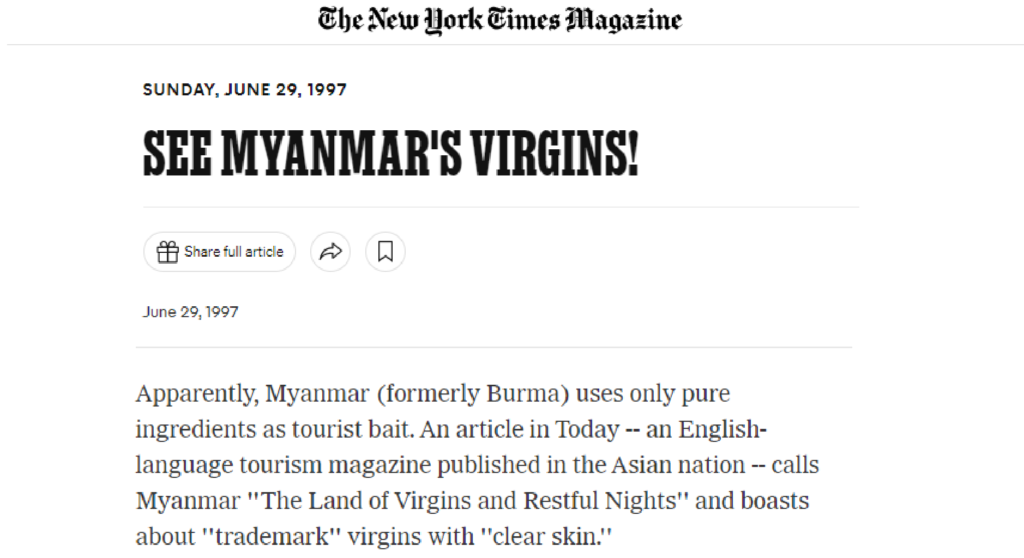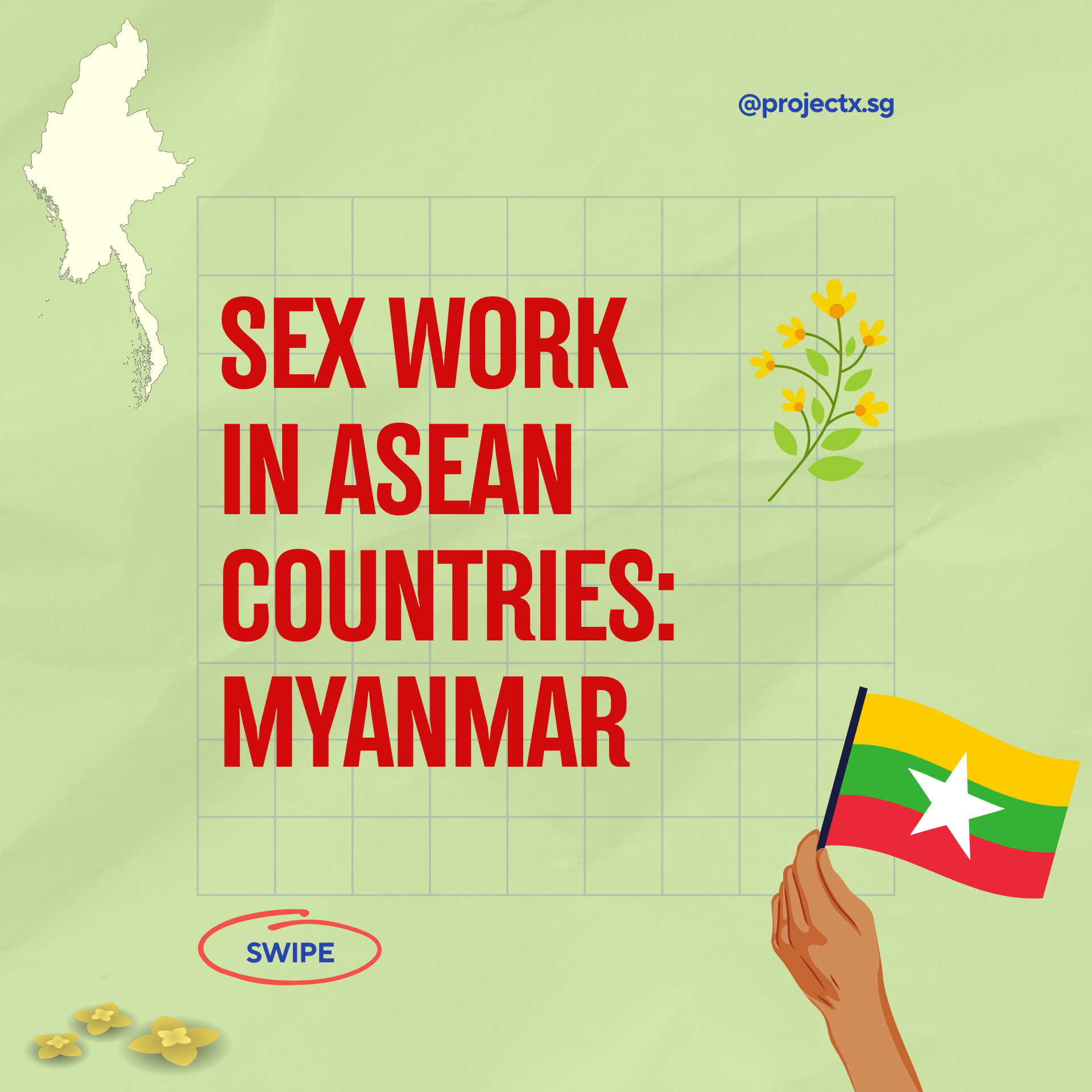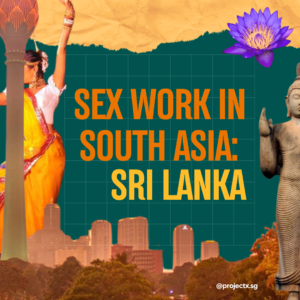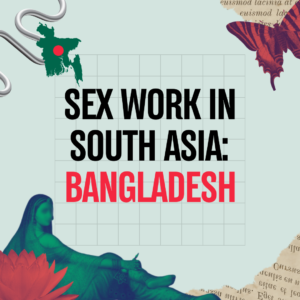Preface
Our latest addition to the ‘Sex Work in ASEAN Countries’ series, this post will expound upon the state of the sex industry and sex workers’ rights in Myanmar (formally Burma). It will also touch on the history and economic impact of sex work, sex work statistics, sex work in Myanmar’s cultural context, and finally, the future of the industry in Myanmar.
A Brief History of Sex Work in Myanmar
Click on our visual below to learn about the development of the profession in Myanmar!
On 2 February 2021, the armed forces in Myanmar carried out a coup d’etat and installed a military regime. This has resulted in an economic downturn for the nation-state. Since then, there has been a noticeable increase in the number of street-based sex workers in Yangon, waiting by roadsides in townships such as North and South Dagon, East and West Hlaing Tharyar, Thaketa, Insein, and downtown Yangon (Moe Taw, 2022). Business has been badly affected since the pandemic and with the military seizing power, anecdotal evidence shows that sex workers are getting less than half their pre-coup minimum rates of K20,000 (SGD$12.78), where it is even more difficult to negotiate the prices favourably on sex workers’ terms (ibid.). Curfew impositions by the military also deprive sex workers of their peak working hours as they risk arrest for working late (ibid.). Furthermore, increased lawlessness under military rule translates into higher risk of brutality and extortion by criminal gangs which has been on the rise (ibid.).
Law, Policy, and Policing
Sex work has been made illegal in Myanmar since 1949, under the Suppression of Prostitution Act (Chen, 2023). Specifically, women who are accused of being sex workers or pimps can face up to a 3-year sentence in prison. Yet, the law does not criminalise customers of sex workers (AIDS Data Hub, 2018). Previously, condoms had often been used by the police as evidence of sex work, even though the 1949 Act does not have a provision for condom criminalisation (Hlaing, 2023). The law also enables the police to persecute a woman if she simply has the reputation of being a sex worker, even if she has already left the industry. In 1998, the Law Amending the 1949 Suppression of Prostitution Act was enacted, which further extended the maximum imprisonment term from three to five years for illegal sex workers (International Law Organisation, n.d).
Though the 1949 Suppression of Prostitution Act is not applicable to male or transgender sex workers, Section 377 of the Penal Code dictates that both heterosexual and homosexual sodomy are illegal, which also serves to criminalise male sex workers (Chen, 2023). If charged, they might face a sentence ranging from ten years to life imprisonment.
The legal situation for sex workers only started to gradually improve in the 2000s, where condom criminalisation was banned under an unpublished internal directive in 2001 (Transnational Institute, 2016). In 2000 and 2001, Centres for Women Care (CWC) were established in Yangon and Mandalay respectively (AIDS Data Hub, 2018). Sentenced sex workers and HIV positive imprisoned women would be sent to CWC to take part in different programmes, such as psychosocial counselling and vocational training.
However, efforts to push for formal legal reforms in favour of sex work protection have been dismal. In 2013, Member of the Parliament Daw Sandar Min called for the decriminalisation of sex work, but the proposal was shot down by the Parliament. Subsequently in 2015, amendments to the infamous 1949 Act that sought to persecute clients of sex work were put forth, but were met with criticism stating that sex workers should be protected instead of punished. The amendment proposal eventually did not yield any fruition. Thereafter, since 2017, numerous government agencies have been looking into provisions for a new law to substitute the discriminating 1949 Suppression of Prostitution Act through meetings and consultations.
Sex Worker Statistics and their Economic Impact
Despite its illegality, the number of sex workers in Myanmar have gone up from an estimated 66,000 in 2015 to 75,000 in 2019(UNAIDS Key Population Atlas, n.d.) . It is also reported that there are around 100 brothels in Yangon alone (Talikowski & Gilleat 2005). As the country is perennially plagued with poverty, many Myanmar women turn to sex work to earn a livelihood (Zhou & Li, 2020). Recruiters would strategically target impoverished rural regions to recruit girls. Sex workers can earn around K78,000 (approximately 60 US dollars) a day, which does not sound like much, but it is already much more than what they can receive per month if they were in another job. Among sex workers, younger women working in KTV establishments would earn the most, while older street- and brothel-based workers would earn the least (Saville & Brown, 2015). Similarly, sex workers who find customers online charge 62% more than their counterparts working in brothels for the same services, whereas workers in massage parlours charge 39% less than those in brothels (Yamada, Kanayama, Yoshikawa & Aung). According to Maxime Boutry, an anthropologist based in Myanmar, recruiters would also particularly seek out virgins, as poor families are willing to “sell their daughters’ virginity to repay their loan” (Arnold, 2017).
Sex workers are also highly vulnerable to contracting HIV/AIDS, especially since most sex work establishments in Myanmar do not provide condoms. This will undoubtedly contribute to the high adult HIV prevalence rate (one of the highest in Asia)(ASEAN, 2009).
The COVID-19 pandemic also took a toll on the sex work industry in Myanmar. Establishments like bars, hotels, and massage parlours, which were typically where the workers found their customers, were closed due to social distancing measures (Philipp, 2021). The scarcity of customers coupled with an influx of workers due to the economic downturn had prompted sex workers to reduce their prices from between K15,000 and K30,000 to K5,000.
Culture, Religion, and Social Norms

As with many Asian states, sex work remains taboo in Buddhist-majority Myanmar society. In fact, the topic of sex itself is such a taboo, that there is no proper term for ‘vagina’ in the Burmese language (The Wire, 2017). The concept of virginity is also placed on a pedestal, so much so that an 1997 English language tourist brochure cited Burma as “The Land of Virgins and the Restful Nights” (The New York Times, 1997). Accordingly, Andrea Valentin, the founder of the NGO Tourism Transparency, believes that “in a conservative country like Burma, where sexual activity is seen as a very private matter, the sad truth is that it won’t be too difficult to develop a thriving sex tourism industry.” (Paquette, 2012)
“People from her neighbourhood know she is a sex worker. They do not talk to her. Some of them do not let their children play with her children…Sometimes someone in the neighbourhood has a donation event at their house. It can be religious, or a birthday, but they make her eat alone. Nobody will eat with her.”
– a street-based sex worker in Yangon recounting a fellow sex workers’ experience with social and emotional discrimination
Sex workers are discriminated against by institutions, within their communities, and by their families (Saville & Brown, 2015). Institutionally, there is significant stigma when sex workers try to access health services or are stopped by law enforcement. If a worker is unable to attain the necessary healthcare services, it will also increase the risk of the worker contracting HIV. When dealing with government agencies to settle property or domestic disagreements, workers would be told that “they were not entitled to any hearing or arbitration because of their profession”. All of these forms of stigma and abuse simply serve to alienate the already marginalised community sex workers more, rendering them helpless without any forms of social support at all levels.
The Hope for Law Reform
Multiple NGOs advocating for the rights of sex workers have sprung up over the years. NGOs such as Aye Myanmar Association (AMA) and Sex Workers in Myanmar (SWiM) seek to outlaw the criminalisation of sex work and other forms of human rights abuse that sex workers might face (NSWP, n.d.). The attempts made by Members of Parliament to push for reforms or amendments to the 1949 Act also plant hope that the country is gradually moving towards being more accepting of sex work, no matter how measured and miniscule the progress is.
Researchers from SWiM, CARE Myanmar, and Options, have put forward a set of recommendations, which included a push for legal and policy reform – to decriminalise sex work and address economic and social empowerment within other gender-based policies that can affect sex work, in a research report titled “Living on the Edge: Sex Workers’ Lives in Myanmar” (Saville & Brown, 2015). At the same time, there are hopes to work with the police to train and reform its policies to address the institution’s abuse of sex workers.
As of 2018, the Ministry of Social Welfare, Relief and Resettlement has been trying to change the law to protect sex workers. Dr. Sid Naing, an expert in combating HIV from Marie Stopes International, who is also assisting in amending the Suppression of Prostitution Act, acknowledges that it is difficult for sex work to be legalised due to religious and cultural restrictions, but she and the coalition of lawmakers and scholars have been working to push for a reduction in jail term and fine, criminalisation of human trafficking, the criminalisation of forcing women into sex work without their consent, and the criminalisation of having children engage in sex work, with or without consent (Hlaing, 2023).
Some have otherwise cited that a broader shift in cultural perception towards sex work is more impactful than pushing for legislative reforms, when it comes to improving the livelihoods and security of sex workers (Gleeson, 2020). In particular, Daw Htar Htar, the founder of the sex education civil society group Akhaya Women, highlighted the double standards in Myanmar, where “there was no cultural sanction for men who visit brothels, while women in the sex trade were universally ostracised”, when these sex workers are already “the group who receive the most oppression and discrimination”.






